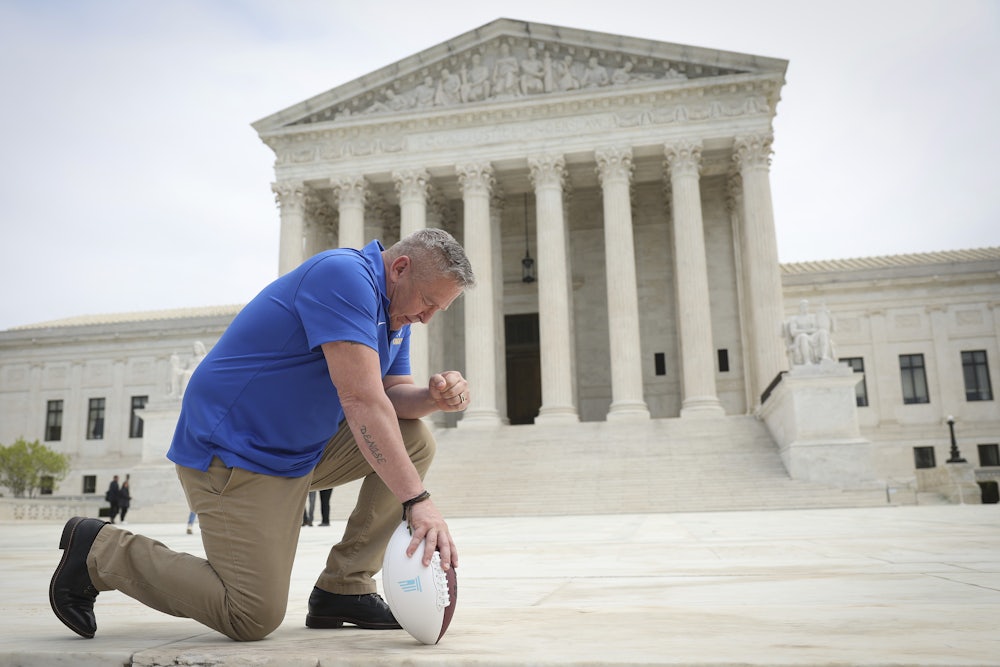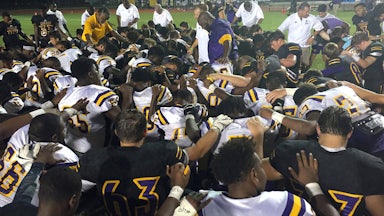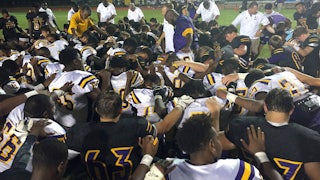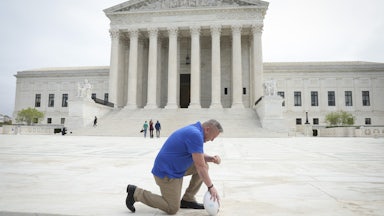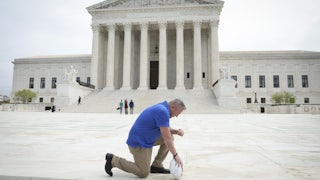Before and after his high-profile Supreme Court case last year, Joe Kennedy became one of America’s most prominent faces of religious freedom. The Bremerton, Washington, high school football coach—whose contract was not renewed because he refused to stop staging public prayers in the middle of the field while serving in his capacity as a public school employee—went on a years-long media blitz, sponsored by his lawyers. He told dozens of outlets, mostly sympathetic but some less so, about his stand for freedom and his claims that he was not just fighting for his job but for all Americans’ freedom of religion and free speech as well. The Supreme Court ruled in his favor, and he got his job back. In the intervening time, however, Kennedy had moved to Florida and quit coaching. After flying back to coach one game, he resigned.
Kennedy’s memoir, Average Joe, was released in late October. When I read news of Kennedy’s book deal, I assumed that he had opted to become an evangelical celebrity, which—with speaking events and built-in audiences in Christian bookstores—is a much more lucrative job than high school football coach. But Kennedy is not an evangelical celebrity, nor does he pretend or aspire to be. “Ask anyone who knows me,” he writes, and “they’ll tell you that I’m not the most religious guy.” In his memoir, Kennedy presents himself as combative, violent, crass, and uninterested in thinking carefully about law or religion. In this way, he is truly a religious freedom celebrity for our times.
Over the past decade, religious freedom has become an effective tool for Christian conservatives to exempt themselves from anti-discrimination laws and other perceived threats to their individual consciences. Manufactured as some of these cases are, they do represent a real problem of pluralism: How do you participate in a diverse society? Can you be coerced into doing something that might violate your beliefs? In Kennedy’s case, he had made a promise to God—“the only real promise I’d ever made Him”—that he would pray publicly at football games. School administrators asked him to stop because, under the establishment clause of the First Amendment, his actions could be understood as an endorsement or promotion of religion by a secular public school employee. When the “wall of separation” between church and state blocked his path, he was incensed that his “constitutional rights [were] being assaulted.”
What makes Kennedy different from other high-profile claimants is that he focuses less on the actual belief and practice (praying at football games) and more on his right to do it. Of his case, he writes, “It was never a religion thing. It was always a freedom thing. It was a freedom thing that just happened to also be a religion thing.”
Other religious freedom celebrities, such as Rowan County, Kentucky, county clerk Kim Davis and cake baker Jack Phillips, have written memoirs that might serve as inspirational fodder for an evangelical book study. Phillips’s book (which shares a publisher with Kennedy’s), in particular, is rife with biblical citations. He even offers a “fair warning as you read: I quote a lot of Bible verses … because these verses are the foundation upon which I’ve built my beliefs, my attitude, and my life.” Coach Kennedy, by contrast, admits, “I don’t quote a lot of Scripture. To be perfectly honest, I don’t know a lot of Scripture! As I kid, I hated reading, so to this day I don’t even really read the Bible.” He says that his faith in God comes to him through “coincidences” that cannot be mere coincidences. He hears a voice guiding him and feels God’s leading. When someone tells him that that voice is the Holy Spirit, he recalls, “I didn’t know what a Holy Spirit was. I still don’t.”
In this way, Kennedy is a fairly typical American, most of whom do not have much theological or doctrinal literacy. They often follow intuitions, political rhetoric, and a mishmash of ideas about coincidences, signs, and basic ethics. Kennedy believes that “people overcomplicate Christianity with their rules,” and he prefers only to “live by the Universal Rule: Don’t be a jerk.”
Is this the sort of believer whose free exercise of religion is protected by the First Amendment? The Supreme Court has repeatedly found that only the sincerity of someone’s religious belief, not its orthodoxy or centrality to a system of beliefs, is determinative. Nevertheless, this standard has often favored the devout, as devotion is taken as a sign of sincerity. What might it mean that the latest religious freedom celebrity’s faith is so lacking in seriousness or depth?
When Hiram Sasser, an attorney at First Liberty Institute, called Coach Kennedy to offer to take up his case pro bono, his first question (according to Kennedy) was, “Are you one of those religious nutjobs?”
Other prominent religious freedom specialists, such as Liberty Counsel and Alliance Defending Freedom, employ and are run by people Sasser might refer to as religious nutjobs. First Liberty is just as much a part of the far right, to be clear, but its aim is not the promotion of evangelical values or support for a Christian nationalist project. Instead, it promotes its ecumenicism: “Our nation’s diversity has always been one of its greatest strengths. No matter your faith, ideology, or background, we will always defend your ability to freely live according to your beliefs.” If that statement conjures images of irenic liberalism, the sort of thing a Harvard Divinity School graduate might support, a quick look at its key cases will quickly correct that impression. The first headline is “Flight Attendant Refuses to be Canceled by Woke Airline.”
This combative, defiant spirit—refusing to be canceled, never backing down, standing up to the woke mob—animates Average Joe. There is a lot of fighting. “There must be something psychologically wrong with me,” Kennedy writes, “because I have always loved a fight.” He describes a difficult childhood marked by neglect and abuse. One day, thinking his adoptive parents had moved away and abandoned him, he flew into a rage and destroyed their house. They sent him to live with a family friend, who severely abused him. Kennedy stole a gun and attempted to shoot the man. After that, he lived at a Christian boys’ home, which was also abusive. In turn, Kennedy was violent too.
Whereas many evangelical life narratives dwell on the details of a sinful past in order to celebrate a reformed present, after the moment of conversion, Kennedy does not write about his own violence with remorse or revulsion. While he was in the Marine Corps, someone took a swing at him, and “something in me snapped like it did the day I thought my parents had moved away without telling me.” He pummeled the man to the point of disfiguration: “His bottom lip was split all the way down to his chin, and his top lip was split all the way up to his nose. His nose was split on both sides, just hanging off his face like a flap.… I could see the bone where his upper and lower lip had split. I was thinking he could die.” This story is not offered as an example of a sinner before his salvation. It is proof that he is a fighter.
Kennedy’s nearly 20-year career in the Marines is central to his identity and self-presentation. From an early age, his desire to be a Marine was inspired by his uncle Dan. One day, Kennedy recalls, his uncle yelled at him, and it “scared the living crap out of me. From that moment on, I was in awe. He just commanded respect in the way he carried himself, and I wanted to be just like him.” He and Uncle Dan would hang out occasionally, though they “never really talked,” watching John Wayne movies.
My point is not to call Kennedy’s religiosity into question. As the historian Kristin Kobes Du Mez has chronicled, twentieth-century white evangelicals developed a conception of Christian masculinity that embraced militarism, pugnacity, and John Wayne. There is no contradiction, historically speaking, between being a good Christian and, say, ripping all the fingernails off your hand and “revel[ing] in the pain and the psychological terror it inflicted on the opponent” (as Kennedy recounts doing during a Marine football game). Likewise, “polite zealotry” is still zealotry. But it is noteworthy that Kennedy’s is a new face of religious freedom. Not exactly a mild-mannered, Bible-quoting, devout wedding-cake artist.
What if Kennedy’s abrasive crassness is not a detriment to his cause but, rather, part of the appeal? In district court, Kennedy remembers, “Many times, I wanted to jump up and scream, ‘That’s crap!’ and neck-punch somebody, but I couldn’t.” In a very strange chapter, co-written with his wife, Denise, he recalls kissing her without consent twice, once at age 14 and once when they were married to other people. He uses the word “butthurt” twice. If you find such passages off-putting, consider that other people, perhaps including Neil Gorsuch, might not.
One might wonder, why would Paul Clement, one of the nation’s most powerful and successful attorneys, argue this case before the Supreme Court? The narrow issue at the center of Kennedy’s case—can an assistant football coach pray “privately” in public?—is not very important. Surely, it matters to the coach, and it matters to the students who might or might not be coerced into joining him. But, ultimately, it was a minor local dispute and probably should have been resolved as such. So why did powerful right-wing operatives take an interest in this case?
Some critics have argued that religious freedom used to be a “shield” for protecting religious minorities but now is often a “sword” for attacking others. To what end? First Liberty’s goal is to use religious freedom, an increasingly powerful individual right, to shore up the power of individual sincere believers in order to undermine the public good. This style of religious freedom, allowing certain individuals to be exempted from the rules that govern public life, has had and will have dire implications for the rights of others. If you are a sincere believer, you can pray in public. You also do not have to serve LGBTQ people. But this antisocial version of religious practice raises all manner of attendant questions. Do you have to also follow laws against workplace discrimination? What about housing policy? From what other sorts of obligations might certain conservatives like to exempt themselves? If you keep asking these questions, you will get closer to understanding what non–religious nutjobs like Clement see in these cases.
The conservative legal movement does not want a theocracy. What it seeks to impose is much more boring than that, and a lot worse. It wants deregulation and privatization. In Kennedy and similar cases, we see what religious studies scholar Finbarr Curtis has called “illiberal secularism.” These are not attempts to Christianize the public sphere. Rather, they are attempts to expand the private sphere into public spaces. This is how Kennedy’s public prayers, surrounded by cameras and students and supporters, are reinterpreted as nothing more than private individual religious acts. And Kennedy’s memoir, read as a strange companion piece to his Supreme Court case, demonstrates another of Curtis’s points: Illiberal secularism is about profanation, violating liberal norms of civility in order to “own the libs.” In a new era of religious freedom, the crassness is the point.
The most shocking passage in Average Joe is this one: “My players worried about my opinion of them more than anyone else’s.” Kennedy’s case hinged, in part, on whether his players might have felt coerced to join him in prayer. In her dissent, Justice Sonia Sotomayor wrote, “This Court has recognized that students face immense social pressure. Students look up to their teachers and coaches as role models and seek their approval. Students also depend on this approval for tangible benefits.” Kennedy and his legal team scoffed at the notion that students might have felt coerced—or that Kennedy had any “tangible benefits” to offer, since he was not in charge of who played and who did not.
His own job, though, as he describes it, was not to coach the x’s and o’s but to be “a father to the fatherless.” He does not know much about football; instead, he was there to teach “mental toughness.” He used, in his words, “a lot of psychological warfare tactics with my players, to which they were oblivious.” This certainly seems to undermine Kennedy’s claim that no coercion was involved, that all his players knew they were free to pray with him or not, and that it would have no effect on them. It is difficult to imagine a scenario in which someone is both a father figure waging “psychological warfare” and, at the same time, in no way coercive.
One lesson from Kennedy v. Bremerton—and Dobbs, handed down three days earlier—is that the current court has political power, and it plans to use it to advance a political agenda. Justice Neil Gorsuch’s majority opinion in Kennedy was notable for its skewed description of the case’s facts. His depiction of Kennedy’s private prayer was so incongruous with the actual events that Sotomayor included photographs in her dissent, in an attempt to set the record straight. Gorsuch’s opinion is a blatant display of power—where the truth got in his way, he concocted a fiction to dodge it. They have a majority, and they will do what they want.
In Average Joe, Kennedy attributes this majority, and thus the success of his case, to God, evidenced in a “coincidence”: “Even the way the Supreme Court kicked my case back down to the lower courts was used by God to give us time for the Court’s political leanings to radically change,” he writes. “Barrett, Gorsuch, and Kavanaugh all reflected conservative values, which boded well for my case. Coincidence?”
Today’s right-wing legal movement is well coordinated, deep-pocketed, and radical. And Christian conservative legal organizations, specializing in religious freedom litigation, are a key node in the network. They are not defensive. They are here for a fight. And for now, they’re winning.
